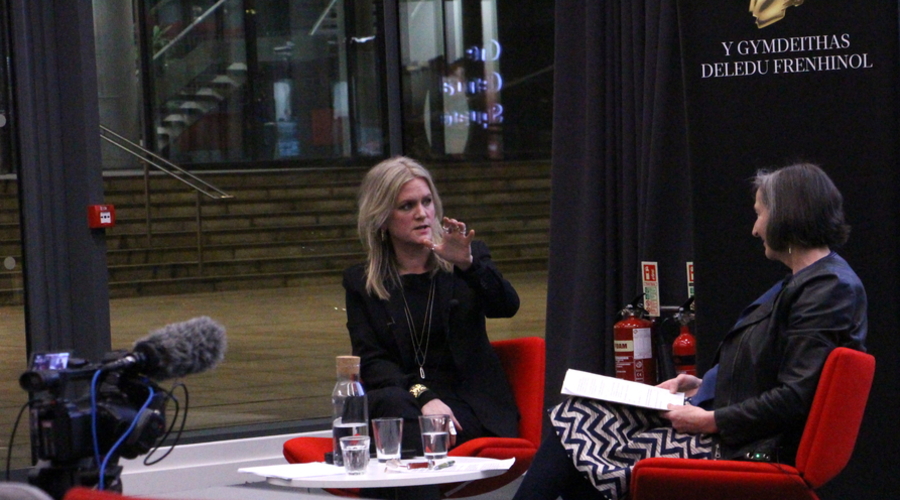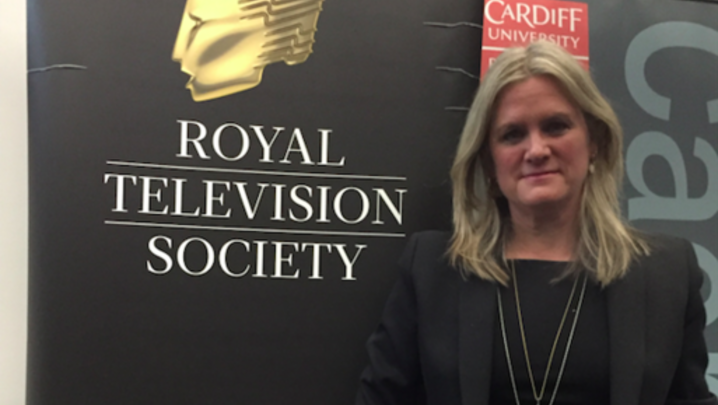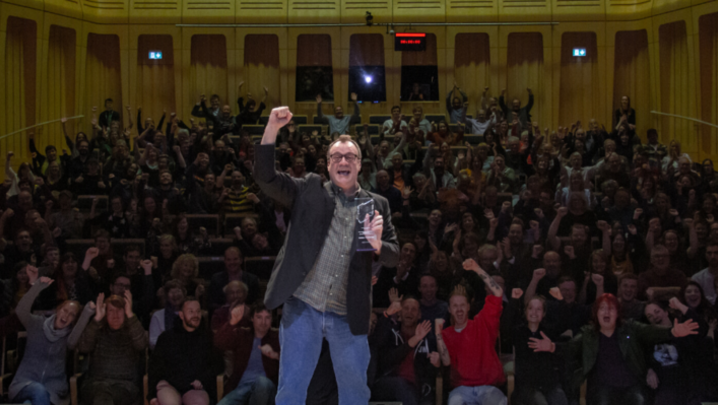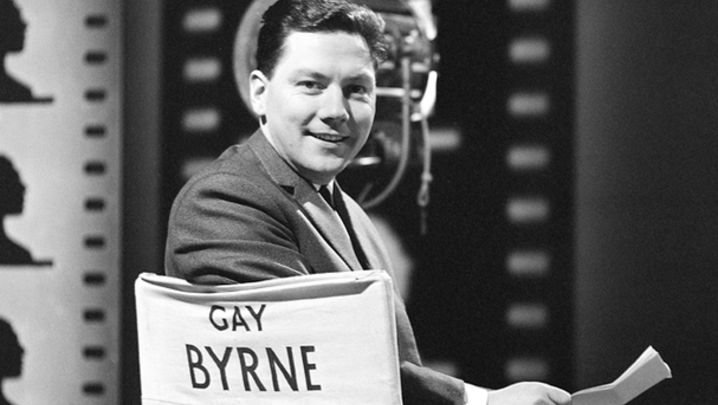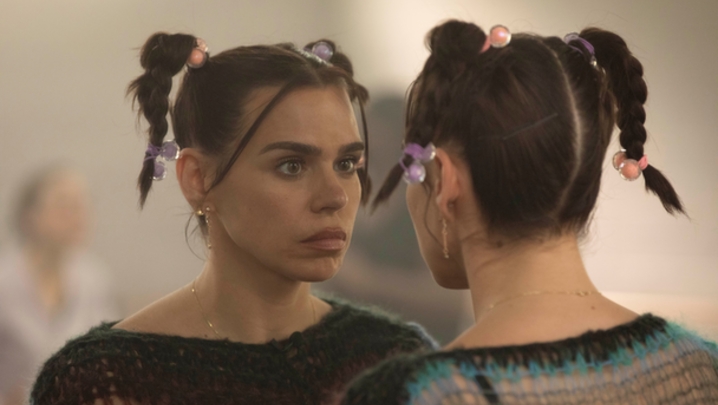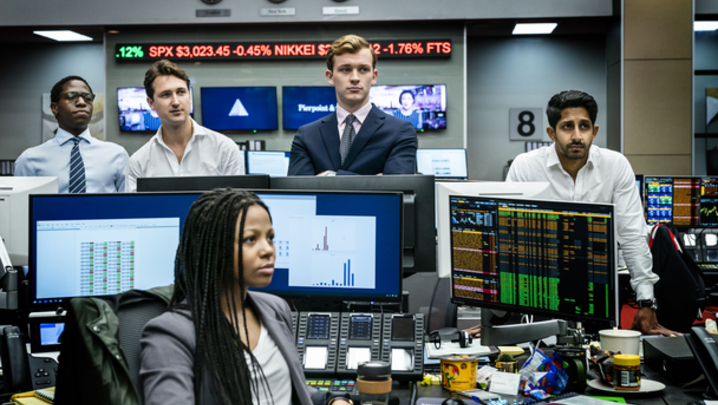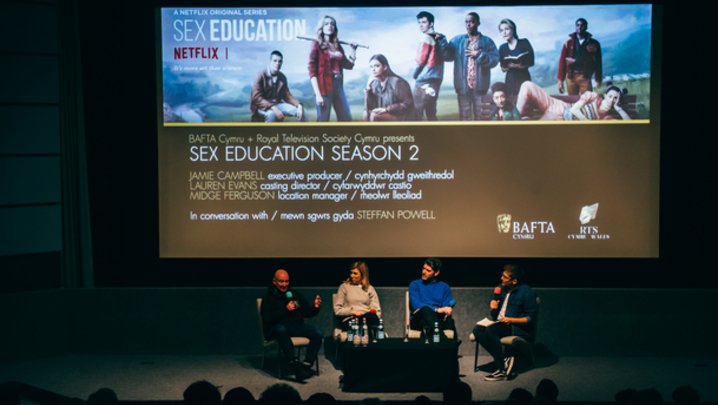Following is the full text of Jane Tranter's RTS Cymru Annual Lecture, given at Cardiff University's School of Journalism, Media and Culture on the 27th of February, 2019.
Thank you to RTS Cymru Wales for inviting me to give this year’s lecture. It’s a privilege to be with you all here tonight, particularly as we’re here in this shiny building – the new home for Cardiff University’s prestigious school of journalism, media and cultural studies as well as, of course, BBC Wales.
Opportunities such as this give a rare chance to reflect publicly on what has been an incredible few years - a constant and glorious work in progress that myself and the other Bad Wolves are passionately driven and obsessed by.
My instinct when being told I could speak on whatever subject I wanted to tonight was to focus on the editorial and creative ideals and issues that we are the life-blood of Bad Wolf. But without the necessary regional support in place, those editorial and creative ambitions will remain just that - ambitions and not tangible realities.
My hope is that by sharing some of the journey of Bad Wolf with you tonight, reflecting on what we have achieved and our future plans for the company, we can also consider what we need to do to sustain it. Planning for this sustainability is crucial, not just for our Bad Wolf business, but for all of us - all of you - rooted in the creative industries in Wales.
Wales is, and in differing ways long has been, a hotbed of both creativity and industry - a unique melting pot of literature, music and drama - and sheer bloody hard graft. if there’s one thing I have learned over the years, it is that Wales is not afraid of hard work or a challenge.
But it’s my view at the moment, that there is a glass ceiling on what Bad Wolf - and the creative industries as a whole - can achieve here.
That ceiling exists because of uncertainty and lack of clarity about the commitment to developing a skilled workforce, and investment in growth and fit for purpose studio space. Bad Wolf, as of now, is growing - but if production companies such as Bad Wolf are the only ones growing, or there’s a bracket on their growth, then that’s not sustainable and we are storing up trouble for the future.
Training in the arts and journalism in Wales has always been strong: but how much of that talent is genuinely incentivised to stay here to develop the next generation and the generation after that? And what about the much needed and valued skill-sets outside of the university taught creative areas? Meaning that the big question facing us today is: what can we do to ensure that we can break through this particular glass ceiling? I have never liked a glass ceiling... and am hoping that this evening we can work through some answers to that question.
Starting up a new company in Wales has been an exhilarating journey so far. The best of times and the worst of times, but always exciting times. A few years ago, having been living the dream in Los Angeles... Julie Gardner and I decided to throw ourselves into a brand new adventure, wake up, and live a different dream. In August 2015 we created Bad Wolf, an independent production company, built to make high-end ambitious, authored drama for global audiences. In Wales. Our mission: to bring the world to South Wales and South Wales to the world. And somehow, with a lot of help from a lot of very talented people, we seem to be doing just that.
It really did begin with A Discovery of Witches, our first major production, filmed in our newly created Wolf Studios in Cardiff Bay. From there we finished post-production on the HBO Emmy winning The Night Of and started prep on a hugely ambitious adaptation of Philip Pullman’s HDM for the BBC and HBO.
The first season of A Discovery of Witches tx’d on Sky One and became their biggest launch of 2018. Sky’s research team recently revealed that it has also become their best loved drama series of all time - less than six months after launch. It has subsequently broken all records on streaming services Sundance Now and Shudder in the US and will have its linear TX on a simulcast with AMC and BBCA in April. It has also sold all over the world and was nominated as Best New Drama at the National Television Awards alongside Bodyguard and Killing Eve. Oh, and it’s also been commissioned for a further 18 episodes.
Alongside of this we created the fantasy world of the first season of Philip Pullman’s His Dark Materials - which we’re making for the BBC and HBO - in Wolf Studios in Cardiff Bay, and are currently in post-production for this while prepping a 2nd season. 2019 will see us start filming on three major productions, including a new forthcoming HBO series, all to be shot in Wales, with a combined budget of over £100million. I kind of have to pinch myself when I say that.
But while aiming high, and creating new worlds for global audiences, we also made Beddgelert, a tiny budget Welsh language short film for S4C that gave nine crew members their very first taste of working in television. And that balance, that dichotomy, is at the very heart of Bad Wolf: build big, but also build foundations. Which is why one of our proudest moments on this journey so far was last night when Bad Wolf won Best Company for New Talent at the Edinburgh TV Festival New Voice Awards. An award which acknowledged Screen Alliance Wales and the 3,500 school pupils so far who have been introduced to television through our educational work. This work continues in schools across Cardiff, the valleys and surrounding areas to break down the perceived socio- economic barriers into the industry.
The vision, which Julie and I shared for years, is now a reality. Just like a proud parent raising a child, we are nurturing it, investing our energy and passion in it, watching it grow and are ambitious for all aspects of its future.
I use that analogy of raising a child quite deliberately; for context, I want to take you back 15 years.Before 2003 and the now well-known decision to bring the production of Doctor Who to Cardiff, Wales - and arguably the other Nations too - have always seen by the BBC – including me – as a ”problem child”.
As the BBC’s Drama Commissioner from 2000 to 2009, what I lacked in those early years was the open-mindedness and awareness to see that it was the generalised attitude of the BBC towards Wales that was actually the problem, not the place itself.
When I first approached Russell T Davies about showrunning Doctor Who, it was assumed we’d be shooting in a major drama hub such as London or Manchester. But I had a problem in that, as part of my remit as Drama Commissioner, I badly needed to make something from Wales (we were doing ok with Scotland and NI, but Wales, not so much.). So why not bring the multi-million production that was Doctor Who to Wales?
Well, maybe because in 2003, Wales produced no network shows. Not one. Perhaps because there were no Ofcom rules telling the BBC they had to. Perhaps because they’d just got out of practice. There was strong performance for made for Wales drama like Pobol Y Cwm, but not much in the way of crew, no infrastructure and no track record.
I’ve never been very keen on relying only on experience or following what’s already been achieved. I believe you can - and should - train for experience and skills; and employ for talent, passion, commitment and enthusiasm. Anyone can gain experience, but you can’t teach attitude or passion. I believe you should always try and zig when everyone else is zagging to always be moving in the opposite direction the traffic is going in.
And while Wales at that time might not have had much experience, under the leadership of the now Welsh national legends Russell and Julie, it had all the talent, passion, commitment, enthusiasm, attitude stuff in spades. With that at my back, I was able to convince an excited BBC Wales - and a distinctly less excited BBC London - that Wales was the right home for Doctor Who. And so it was. The BBC took a risk and Wales ensured it paid off.
This is a story you now all know, the stuff of TV history. It’s arguably the reason we’re all here now tonight, providing the foundations that drama in Wales stands on today. The experience taught me an important lesson. Just as with a “problem child” in a classroom, the issue most often resides not with the child, but with the teacher - or parent. Invariably, “problem children” are the most interesting in class and often mature into the best of us, the most unique and lovely of adults. All they need is acceptance, opportunities and a chance to grow and thrive.
And grow it really did. Our time making Doctor Who in Wales was challenging, joyous and creative - the best of experiences. Russell, Julie and I made five seasons of Doctor Who together - around £60m of heavy investment into drama made Doctor Who the trailblazer that led to the BBC making Torchwood, Atlantis, Sherlock and many other TV dramas here in Wales. And where we led the BBC, the rest of the world was to follow, FX with Bastard Executioner, TNT with Will, Amazon with The Collection, and more successfully Netflix’s recent hit series Sex Education.
It was after those BBC years, that Julie and I ended up in Los Angeles, creating and running the production companies Adjacent and BBC Worldwide Productions and making over a thousand hours of television, so really quite busy. The first major drama we made while in the US was Da Vinci’s Demons, for Starz. With them, we scouted countries all over the world to find the best place to base the series, particularly those that offered a lucrative tax incentive — Eastern Europe, Canada, South Africa, all the usual suspects.
Despite the UK, at that point, not having the magnificence of its current UK tax credit, and it not being obvious that it would be the most financially viable location, we believed in Wales, its production community, its creative community, its brilliant crews and were convinced that the American dollar would get better value from Wales than anywhere else in the world.
Frankly, it wasn’t easy to convince an American network that a disused factory for fridges and car parts on the outskirts of Swansea, a long, long car ride from Heathrow, was the place to film a big budget historical fantasy set in renaissance Florence. But we like a challenge and convince them we did. The show ran for three seasons, picked up multiple awards, and was a triumph of Welsh-based production values.
We realised, looking back, that all roads had always led to Wales. As Bill Clinton famously said, “It’s Wales, stupid.” (Or he said something almost like that). When we announced the name of our new company, there was talk of whether it was in fact a production company or another example of Rose Tyler scattering messages throughout time and space. I am pleased to confirm we are definitely a production company - even if our ambitions are, like Rose Tyler’s, to reach the four corners of the universe and save the world (I know the Welsh are always up for a challenge).
Just filming in Wales wasn’t enough for Bad Wolf. We also wanted to make our home here. And that absolutely meant a head office in Wales - no office in central London, like most independent production companies, with an outpost in Cardiff once filming started. We wanted to be based where our productions were, to be where our crews were. And to ensure we could do that we didn’t take investment from the traditional route, through a studio, super-indie, broadcaster or distributor.
We did it via a commercial loan from the Welsh Government, along with a commitment to locate all of our big studio-based productions in Wales. And then we invested our own money in the former Nippon Electric Glass Company in Trident Park, that is now our wonderful Wolf Studios and the homebase and HQ of Bad Wolf.
We did it this way not because we thought it would be easier - believe me, it most certainly was not - but because it meant we’d be unequivocally anchored in Wales. No-one, no broadcaster or distributor, could at any point tell us to go and film elsewhere, somewhere more economically viable or serving their interests, rather than those of the Bad Wolf vision. By funding our start-up company in the way that we did, we ensured that if a broadcaster or distributor wanted to work with Bad Wolf: it had to be in Wales.
As I said, it was the best of times and the worst of times. There’s no reason why the journey of funding Bad Wolf in this way should have been easy. Sometimes it’s hard for more traditional businesses – and indeed government - to get their heads round what we do in TV. The research and development part of what we have to go through before we can get a green light/financial backing to start filming can seem intangible. And the amounts of money in the tv industry are supersized because filming, by necessity, is a deep, deep pocket investment. It’s an odd, unintentionally smoke and mirrors mix of creativity and industry - actors and scripts and construction and generators. And a lot of hefty investment based on things which have yet to be proven: a leap of faith that is after all the nature of our business and the alchemy of film-making.
Although not everyone has always been supportive of the leap of faith that the Welsh Government made in Bad Wolf. Wales, with its talented, energised and down to earth people, its wonderful spaces and locations, has been very good to Julie and I over the years. And in founding Bad Wolf, we were determined to be good to Wales in return. Bad Wolf is committed not just to spotting talent but to training, growing and nurturing talent; to ensuring that as much of our production spend as possible goes in to the local economy; and to both supporting the country and promoting it internationally.
And before you all feel a little bit uncomfortable with how sickly I am beginning to sound - let me be very clear: in order for Bad Wolf to grow, the community has to grow with us. Bad Wolf can’t deliver on its commitment to Wales - or reach its full potential - without drawing deeply on the talent, skills and creative energy of the community around us. Put simply, Bad Wolf won’t flourish unless the industry around it does.
It's about us growing together to help the creative industries as a whole thrive. And there’s much that companies like us can and should - do for ourselves. To help with this, we’ve been lucky enough to have the foundation of some major productions to ensure that we can - and are - getting on with a contribution to helping the wider industry grow as we do.
On our first production, A Discovery of Witches, we had to take the editing to London because there wasn’t the capacity for it here in South Wales. In keeping with our commitment to Wales, we were determined from the start to keep as much of the production spend as possible in the local economy with the result that two weeks ago we have opened newly built edit suites in Wolf Studios, ensuring that moving forwards, no matter what, we can house all our editing in Wales.
Lighting company Panavision have also moved in. That’ll mean more work experience and training opportunities for the local people. Painting Practice have relocated their business operations to Wolf Studios to capitalise on the skilled graduates from the University of South Wales. We have trained up and employed a Cardiff based publicity and social media team and are building a network of local photographers and EPK crews – marketing skills which are vital to the US Networks and which were previously parachuted in from London or even LA.
Because training is so important to us, a significant sum from each production using our facilities is invested in training and education through Screen Alliance Wales. Our on-site education centre - the classroom in our studio - allows youngsters to come to the studio and learn about the industry and lets them dream about becoming tomorrow’s trainees who in turn can dream about having all of our jobs - and have them they must. But it is also about widening opportunities – letting young people know that you can come from any background, not know anyone, and still get a job in a creative, global industry.
It’s for that reason that we are particularly proud of our programmes with local schools, to integrate TV production in to the curriculum. Education often falls low on an agenda as it can seem like a long term strategy without the instant gratification of a short term result. But in our world of TV production, this is not even a particularly long term strategy. We have students as young as nine in our classroom: if we can engage their heart and mind with the opportunities our industry can offer, then it’s not even a decade later that they will be ready to come in and work on one of our productions - His Dark Materials, Series Eight anyone?
Some of those school children coming through our classroom may go on to study at the University of South Wales at their Faculty of Creative Industries. We’ve already taken on several graduates in animation, design and coding to work on our latest productions and with the university’s support have recently launched a Screen Alliance Wales portal, which promotes the wide range of skills, services and facilities available here in Wales, including a crew directory along with a variety of jobs, training or work experience opportunities.
Bad Wolf has also created a sponsorship programme for various organisations supporting training in the industry. At present we are giving significant sponsorship to It’s My Shout, the Iris Film Prize and the Royal Welsh College of Music and Drama.
There are so many different roles available on a big budget production and if someone is keen to have a go, then Bad Wolf is keen to give them that opportunity, whether it’s as a runner, a trainee in costume or design, or even working on our reception desk to give young people a taste of what we do.
Enthusiastic as I am about it, I won’t at this stage in the evening stop to detail the long list of examples of people we’ve worked with as trainees, on job experience, who have gone on to full-time work with us but we know that without this access and training, we won’t ever be able to create a broad enough production base to realise the full ambitions of Bad Wolf - and more importantly those of Wales - for it to become a sustainable centre of excellence for drama production. All of this in addition to hiring local suppliers on production – if a supplier isn’t based in Wales and we can find one locally, then we will always hire the local one.
All things to celebrate and be proud of, but this is just a beginning and will not be enough on its own. That ‘problem child’ has become more confident - as they wonderfully always do if they are loved enough. True, it may be going through its gangly teenage phase, but with that it promises great things for the future. Some more careful nurturing during the next few years and a joined up, solid plan for the future will see it - our creative industry - in Wales, fly. We can succeed, working together, I know we can. Why wouldn’t we? As a body, we’re too good to be allowed to fail or let this child be stymied by a glass ceiling.
So, Bad Wolf will do its bit, but everyone else in the industry has to commit to do the same too – and Government can’t expect us to do it all on our own. It’s great news that Wales is becoming a destination for a booming UK drama industry. But Wales has yet to develop a plan to future-proof capability and capacity to support the demands of that booming industry. And if we are not to go from boom to bust, we urgently need a strategy to ensure a sustainable future for the industry and the associated companies now growing here.
With a high-end film and television industry come high stakes. It is a truly global and competitive business. A key reason to locate Bad Wolf in Wales was because we thought the Welsh Government recognised how hard Wales would need to work to be able to grow the industry here. Producers and broadcasters can take their productions and all the economic ramifications that come with them, anywhere; consequently, governments across the globe now offer a range of incentives to secure the productions for their region.
And how much money a production needs from a broadcaster to make it depends on the parameters of the idea, but at Bad Wolf it’s unlikely to be less than £1million per episode, and usually considerably more than that. That money is used to hire and supply everything the show needs. We try to hire as much as possible from the local area – the production crew obviously, but just as important, the carpenters, the scaffolders, the caterers, the accountants and the drivers along with the services of hotels, restaurants and dry cleaners.
The list of the services you need for a global TV drama is actually limitless - and therefore the job opportunities are wide and interesting and many. And as such having a production in your region is a clear win for Government and community alike.
While setting up here, we could see that the industry in Wales needed more than simply having money thrown at individual productions that turned up for six months and disappeared. We recognised that the Welsh Government wanted to move away from only incentivising one- off productions which roll in to town for one series, bringing with them huge excitement and a good boost for local hotels, bars, taxi firms - and a crew from outside the area. Meaning that a few months later when filming stops, the whole circus rolls back out of town again, leaving restaurants and bars empty again, no lasting legacy for that area, no offer of sustainable employment or training opportunities for locals and a metaphorical piece of tumbleweed and an empty crisp packet blowing down the street.
Our Bad Wolf desire to be near our productions, to settle in one place for the benefit of the creative growth of the company and our desire to help anchor a rapidly growing comprehensive industry, clearly sat well with the ambitions of the Welsh Government. We were able to agree with WG an innovative funding model to help kick start our production business, create a stable studio base for all and begin the journey to being genuinely competitive as a centre for drama excellence. Our belief was that the television industry here needed long-term investment in skills and the supply chain, and that should come from a partnership between the industry and government. Of which Bad Wolf is one small part in the chain.
Welsh Government estimates are that the current economic multiplier effect is 1 to 8, with £8 spent in Wales for every £1 spent on supporting the film and TV industry. However, it’s public knowledge that the Welsh Government supported the establishment of Bad Wolf with an initial commercial loan of £4m, with the investment criteria linked both to the profit and a1 to 12,not 1 to 8,onspend. This is in comparison to the 1 to 4 and 1 to 6 multiplier offered in Northern Ireland and Scotland respectively,
These are very tough targets and arguably not competitive. But, if we are successful then our loan becomes a grant and we understood that it was an economic model of funding that reduces the risk to the public purse of investing in a creative industry. And it’s a structure that obviously means that Bad Wolf is highly incentivised to help build an industry here. If we are to meet that 1 to 12 return on spend, we need local staff, skills, spaces to film even more high-end productions and to keep as much of that spend in Wales as possible.
But I am not sure I know of any other studio or production company who would have taken those terms, but we did. We decided to base ourselves in Wales even though we could have had much better terms elsewhere. And we’ve succeeded. We’ve made it work, because of our long history and gratitude with the country. But what about another company, without that history and sense of obligation, would they be motivated to accept the same terms?
And it does make you question whether it is right that, as a nation, we should be offering better terms and incentives to some of those productions who head across the Severn Bridge for a short time - film and then pack up and go - than we do to our home-grown industry? The companies who consistently employ and train local people and have their head office in the capital?
Are they somehow better than us? Is their end product better than ours? Is it more critically acclaimed? Is it because they feel like bigger news? And the home-grown companies simply feel familiar? Is it because a one-off Netflix production promises bigger stars? Not sure they come, in our world, much bigger than Lin Manuel Miranda and James McAvoy, to name but two. And with the backing and support that Bad Wolf gets from HBO - the broadcaster and producer that gave Belfast Game of Thrones - I’m not sure that what we’re bringing into Wales can get much bigger than that.
In my view, Government needs to stop throwing money at ‘new’ short-term ventures and should instead double-down and invest in the foundations we’ve all already built here. To achieve what we have set out to do, and more, we need a partnership with Government that’s as solid and enduring as we hope the production base we are currently building will be.
To take it to its next stage of development, a joint strategy between the industry and Government is needed. One that ensures sustainability for the production houses and the supply chain companies, that are already located and embedded here in Wales.
Bad Wolf is committed to Wales and if taking on more challenging terms of a 1 to 12 return is what we need to do, we’ll gladly do it. But in return, we need help in growing the workforce, and training the next generation. Otherwise, there’s a massive risk that the existing pool of experienced crew simply isn’t big enough to supply both home-based companies like Bad Wolf and those one-off productions, who swoop in to town, lured here on a lower economic multiplier.
To be clear, this isn’t just a whinge about needing more public money or complaining that there are other people sitting on our front lawn. I like to see people using a front lawn. There’s plenty of room here for everyone. It’s about public and private resources and expertise being strategically and straightforwardly pooled together, to plan for the next stage of our development, to properly plan for the future, and future-proofing, of our industry in Wales.
Our creative industry can be a complex one. It isn’t a ‘one size fits all’. In a car component plant for example, you can have one single trainee entry scheme because that production line rarely changes. It won’t work in the creative sector, which is why I believe we need bespoke solutions. And in order to achieve these, my plea tonight would be for government to bring together a group of sensible people from the creative sector - indigenous and based in Wales - to sit around a table, to discuss future skill needs, to map out the training requirements over the next decade and to work out a bespoke package for delivering it. A bespoke package because existing training programmes can’t be easily adapted or shoe-horned into production timetables and the fast-paced nature of our industry. And don’t get me wrong, this is not a call to start looking inward.
I’m up for getting lots of new companies here. Bad Wolf didn’t come here to work in splendid isolation from its competitors. But let’s expect the new companies and productions to stay here; to help grow this industry with us and ensure that we have a booming creative industries sector in 25 years.
Right now, Bad Wolf looks and feels like it is in a big, ambitious place. Three more blockbuster productions ahead of us in 2019. The studio full to bursting - so much so that we are having to find space in other studios in Wales. And the very strong sense that we are still growing and growing. So it’s not obvious at first glance what the problem is.
But with that growth however comes the persistent worry about falling over because the surrounding local industry that we so totally rely on isn’t getting the help it needs to grow quickly enough with us. That the competing demands on the experienced talent available is not met by sustained investment in the next generation of talent.
To be clear this anxiety doesn’t come from the desire to simply keep things as they currently are for Bad Wolf - but from fear of precisely that. That without continual, strategic, fit-for-purpose investment in the television production industry, that we could quickly get to the point where productions - either from Bad Wolf or another home-based company or a company newly coming in - are circling to begin, but without the required, necessary local skill sets available. With the result that the productions will then have no choice but to look elsewhere for crews and studio space, and the growth of the industry will be forever bracketed.
It will only take one additional big budget show to come to Wales and find that there aren’t enough skilled crew locally - for the existing Welsh Government strategy to crumble. The noises off from just one bad experience and Wales’ reputation as a production centre will be irrevocably damaged. The need for us to sit down together and work out solutions is critical and must happen soon. It’s not difficult to be passionately concerned about this. Finding the skills, enthusiasm and talent from all sections of our society and across all ages is vital. But it needs to be done as part of a wider partnership.
If we step up to this challenge, ensure we have good insight into the future needs of our industry, invest in a wide range of skills and maximise opportunities across the board - and not just for those with good academic records or family contacts - then we can have a thriving industry, here in Wales, for many years to come. There’s no reason why Wales couldn’t be the UK - or even European - leader in the creative industries. No reason why we can’t work together to build a sustainable, creative workforce, which will be able to maintain a critical momentum once the initial wave of investment is over.
The next wave of producers, writers, directors, production designers, art directors, location managers, cameramen will be able to go on to create their own programmes, set up their own businesses, use their own contacts with the global TV industry to carry the baton and ensure that their generation and the one behind them, can see that there is a future for themselves here in Wales.
I’ve been fortunate enough to work over a number of years in New York, a dynamically creative city, where there’s open access to lots of jobs and people tend to work in this industry generation after generation (usually father to son, but we can certainly change that here to become mother to daughter.). There’s no reason I can think of why Wales can’t be the best place in the UK for drama excellence and offer the same. Imagine that? But we have to move quickly before the current bubble bursts due to lack of sustainability.
Let’s aim to see within five to 10 years a critical momentum that means that regardless of overseas or government investment, Wales will continue to be a world leader in TV. Let’s aim for one of those nine year old students in our classroom be standing here in 20 years time - sooner if possible - giving the Annual RTS Lecture.
Wales’s issue as the problem child used to be one of recognition. It’s now one of sustainability. Our vision for Bad Wolf in Wales has always been to build a big and persistent enough production hub to ensure that for 52 weeks of the year we are in production and therefore, is keeping employment and training going for 52 weeks of the year. And that’s still my vision.
I come from a working-class Methodist upbringing. My parents were teachers and their parents were mill workers and miners. The thoughts of a career in television just wasn’t on the cards, and indeed felt like it could lead to ‘showing off’. I knew literally no-one in this industry when I first started. All I had was a passion for books, film and theatre and a deeply nerdy love of Doctor Who and Star Trek. And yet here I am. And it’s not because I’m supremely talented or extra fabulous (although I will admit to not minding hard work) but because I had the opportunities to work and grow. I started as a secretary in BBC Radio Drama and since then have been fortunate enough to be allowed to do many great jobs.
But this one, at Bad Wolf, is far and away the best one yet. Because of you. Because of what Wales can give and how lucky I am to be able to benefit from it. I come into work at Wolf Studios each day surrounded by amazingly talented and creative people and together we produce great telly. I hope, with you, to continue doing just that, here, in Wales, for many years to come.
But please, Welsh Government and creative industries, let’s work together to ensure that those who come behind us keep getting those same opportunities too. And that we can progress the current ad hoc short term inward investment to a long term sustainable inward investment with a bespoke focus on talent and skills.
And much as I love a problem child above and beyond any other, let’s not have that be Wales again. There’s too much at stake here, not just for us, but the for next generation, and the one after that, for us to hit a glass ceiling and find we can’t grow to our full potential. I’m not one to be held back by barriers, or glass ceilings, in any area of my life. Together we can find a way – and smash it.

